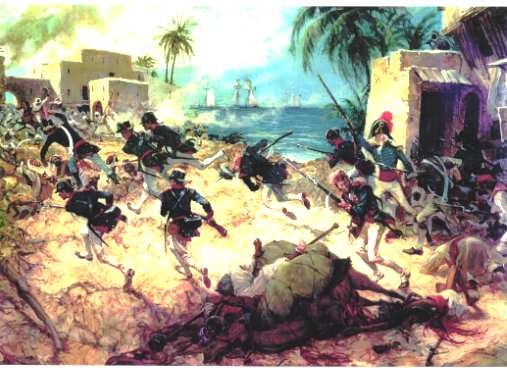Boy, that would be great if these guys were Privateers. Then we would know who to deal with, that contracted these guys. The world shipping industry could also plan their shipping, based on the objectives and laws being enforced by these privateers. But what business, group, country is endorsing these guys? And what exactly are their objectives and what legal authority do they have? And based on the world wide reaction to this, you guys have no support.
I have some questions for Nasr. If these Somali pirates are in fact privateers, then who gave them the letter of marque to do what they are doing? And if their job is to protect the fishing waters off the coast of Somalia, then how is taking down an Oil Transporting Super Tanker, 400 plus miles off the coast of Somalia, accomplishing that job? Did a business give them a letter of marque, did the government give this authority, or what? Privateers would indicate some kind of attempt at maintaining a law or the sovereignty of a country, or defeating the enemy of a country. To me, the activities of these thugs indicate no such thing.
Also, it sounds to me like these ‘privateers’ are stealing from local Somali fishermen, and not specifically targeting illegal foreign fishermen. That is criminal, to steal from the people of Somalia, yet that is what they are doing. Also, foreign fishing vessels would not risk going into the lawless and dangerous waters of Somalia. If they did, they were idiots, because they would have no hope of protection under some rule of law.
The other problem I have with this, is who are these guys privateering for? Because if they were actually privateers of a government, then it looks like to me that the Somali government is purposely attacking foreign vessels, not because of fishing violations, but because they want to steal from them or extort them with hostage taking. And what authority do they have, to do this in International waters? And who is the enemy or target of the government in this case?
Now if these privateers are being sponsored by local business, then what is the business and who are the owners? Because in the west, we call businesses that hire pirates to loot boats out to 400 miles plus off the coast in international waters, organized crime. Of course if that business was endorsed by the government, then we are back to question of the Somali government blessing this activity and what the government’s intent was. Is the whole world the enemy, and is this why all ships are fair game for this activity?
Whatever the case, this is piracy in my view and in the majority of the world’s view. Until these businesses or the government comes forward to claim responsibility for contracting with these privateers, they are still called pirates. These pirates have no morale authority what so ever when they attack vessels and rob from them or take hostages for ransom, and do all of this well beyond Somalia’s coastal waters, out in International waters.
Also, this kind of ties into my article I posted below about privateers. During the US Revolutionary war, our privateers had a clear objective, a specific enemy, and had total endorsement by my young country. If in fact Somalia is claiming these privateers as theirs, then come forward and proclaim what the objective is and who is your enemy?
Or maybe a non-state actor is contracting these privateers. Perhaps Islamic extremists are the ones who are using these supposed privateers, and this is what is really going on. Although then we go back to why would they take down a Saudi owned Super Tanker in International waters?
Bottom line, these are not privateers, these are pirates who if anything are working for organized crime in Somalia. The country of Somalia is a failed state, and crime flourishes in failed states. Extremists groups like Al Qaeda, love to set up shop in failed states, because there is no rule of law to hinder their presence or stop their training and operations. It would not surprise me if extremist groups were contracting with privateers, but I mostly point my finger at organized crime and a country’s inability to stop that crime. So Nasr, your argument is crap. –Head Jundi
——————————————————————
The Unlicensed and Undocumented Privateers of Somalia
9 Dec 9, 2008
By Nasr Ibn Othmann
I must admit that I was rather amused when I first encountered the phrase Unlicensed and Undocumented Privateers of Somalia. When I reflected upon these words for a moment, I realised that this is the perfect description of the noble men who currently guard the marine resource of the Somali nation. It is true that they have attained global fame, and that their exploits are being reported in all corners of the world. However, we must never tolerate the blatant racism that underpins the usage of words like Somali Pirates, or Islamic Pirates. We, the Somali people, must never tolerate the speculative statements, of so-called journalist experts, who earn their pay by dreaming up potential linkages between international terrorism and the honourable business of protecting Somali territorial waters.
(more…)
